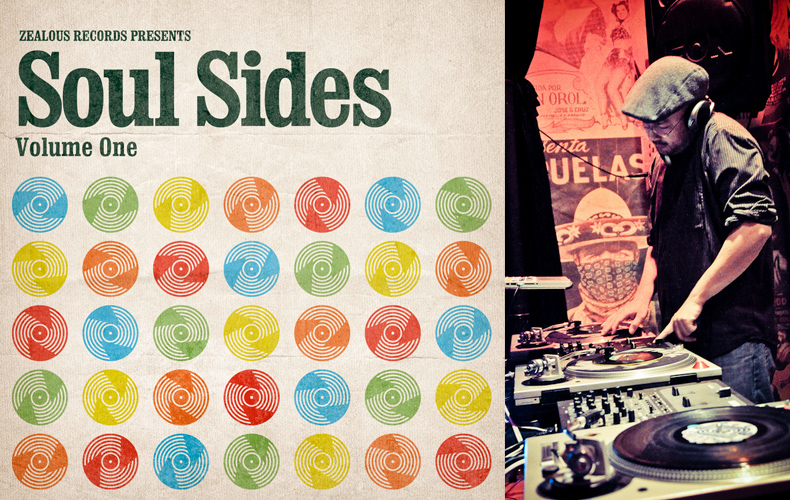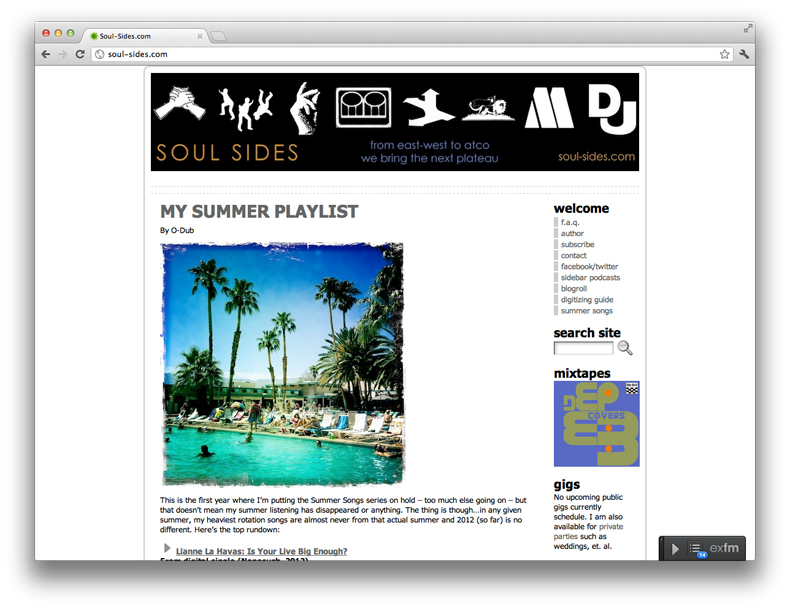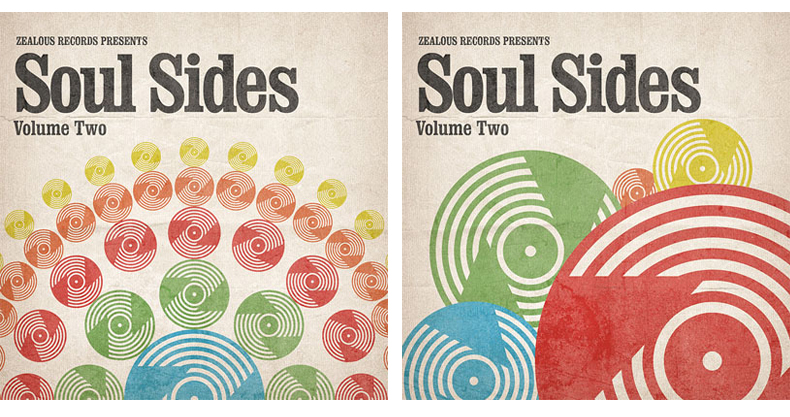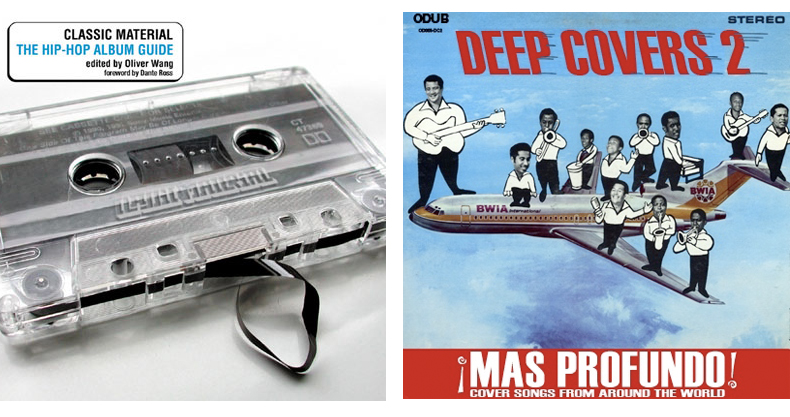Jul 23, 2012 8 Questions With: Oliver Wang
The shortest way to accurately describe Oliver Wang might just be to say that he is a very, very busy guy. In attempting to describe his many roles and undertakings in much more detail than that, it’s hard to know where to begin. You could say he’s an accomplished journalist & author, a scholar, and a great DJ too. But those labels don’t quite do him justice, either. For example, he’d perfected the art of blogging, back before Friendster was founded. And somehow, he manages to wear all these hats simultaneously. My first contact with Oliver’s work was as a reader of his popular music website, Soul-Sides. The “audioblog,” which has been going strong for over a decade now, has spun-off into two official compilation CD releases. Around that time, he edited and co-authored the book Classic Material: The Hip-Hop Album Guide, which was published in 2003. The list of publications he’s written for is a who’s-who of respected music journalism outlets including: NPR, Wax Poetics, Los Angeles Times, Village Voice, Vibe, Spin, URB, and more. O-Dub also has an impressive ten years in college radio under his belt. These days, he continues to put out some incredible mixes via Soul-Sides, and he spins at events from time to time too. Since 2006, he has been an Assistant Professor of Sociology at CSU Long Beach, teaching courses on pop culture, social issues, and gender equality. And before this gets too overwhelming, let’s not forget Oliver also co-foundered the parenting blog Rice Daddies. Imprint Culture Lab were lucky enough to distract Oliver from his regular duties for long enough to find out what he’s up to lately, where he finds inspiration, and how he manages to get it all done.What are you currently working on?
This summer, I need to finish up revisions to a book I’ve been working on for years now: Legions of Boom, which is about the Filipino American mobile DJ crew community in the S.F. Bay Area. It’s based on my dissertation research and it looks at this fascinating and vibrant DJ scene that very few people outside of the Bay Area ever realized existed. After that gets put in the bag, I have a slew of back-burner projects awaiting my attention. Luckily, I’m on sabbatical through the fall.
How would you describe your job?
Ha, which one? I’m a full-time associate professor of sociology at CSU-Long Beach but my part-time pursuits include everything from writing about music and culture for NPR, the LA Times, and KCET, to DJing and collecting records, to blogging about all the above. As my friend and colleague Hua Hsu put it so beautifully: “I can monetize my curiosities” which is a fancier way of saying “I get paid to write and think.”
Of your three main passions (writing, teaching, sharing music) which is the most time-consuming, which is the most rewarding, and which could you not live without doing?
Teaching is most definitely the most time-consuming. It’s not just the physical time it takes to prep and give my lectures or grade my assignments, it also just takes up a lot of mental time/energy. As a writer, I prefer big blocks of time to work with – a dedicated day, if not a week or month – and teaching chops up my time in a way that makes that much more difficult. Ironically, by doing so, it may also make me more efficient as a worker since I’m constantly trying to get as much done in relatively little time.
Writing is the most rewarding, especially because it’s a craft that never stops being challenging or forcing me to evolve. And there’s a real satisfaction in knowing that I was able to take this jumble of ideas or emotions in my head and make them vaguely coherent through writing.
Given that most of my writing is linked to sharing music, I’d put the two together as the thing that I can’t live without doing. I’m not a bad “talker” – years of doing radio and teaching help with that – but writing has always been my primary method of expression and communication; definitely can’t live without that outlet.
What does your average work day look like?
It depends on which day, whether I’m on campus or not, what deadlines I have that are most immediate, etc. The one constant is that, as a dad, I usually have to take my daughter to school and/or pick her up so those tasks bookend the day. But in between, it very much varies. I do try to use my mornings to be most productive. I’m naturally (biologically) a night-owl but parenthood makes that difficult so I’ve learned to try to make the most of my mornings whenever possible. Music, when I have time to get to it, is usually in the afternoon or late evening. To be honest, one of my favorite weekend activities is having a morning to myself to just digitize vinyl and write about it. Sad, I know.
Where do you find inspiration?
Other writers. People who seem to just effortlessly weave together ideas and these gorgeous turns of phrases. I have massive respect for Ta-Nehisi Coates, who I think speaks the kind of truth to power I wish I knew how to do better. I’m also a big big fan of the aforementioned Hua Hsu and given that he’s also one of my closest friends, I probably have a conflict of interest in big-upping him but he has a marvelous voice as a writer: it’s “personal” without having to depend on “I statements” and there’s something about how his thoughts will shift in unexpected directions yet feel completely natural at the same time.
Generally speaking, music is a source of pleasure more than inspiration except on those rare occasions where a song or album will thunder-strike me and compel me to want to write about it. That doesn’t happen every day but when it does, it’s one of the strongest compulsions I know. It’s like I feel a duty towards writing about it.
As a kid, what did you want to be when you grew up?
Originally? A zoologist or marine biologist. I’ve always been fascinated by animals and the ocean but I never displayed much of a proclivity towards science so that was out. In high school, I thought I’d grow up to become a civil rights attorney or litigator but that was mostly because the kind of high school I attended had a very narrow imagination when it came to future professions: doctor, lawyer, business person, engineer – that was about it. So I chose law but I never had a great reason for wanting to pursue it. If “writer” or “filmmaker” had been options, I would have gravitated far more in those directions.
What are you reading at the moment?
Gustavo Arellano’s Taco U.S.A.; it’s an impressive history of Mexican food in America, looking at the kind of cultural and economic forms of exchange and innovation that’s lead to certain kinds of Mexican food becoming as American as pastel de manzana. There are times that I wish I read more fiction, just to expose myself to a greater variety of prose styles, but I naturally gravitate more to non-fiction.
What’s your favorite post-work destination?
What is this “post-work” phenomenon you speak of? Work…ends? I mean, for me, writing is my leisure time.






